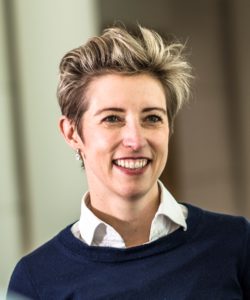Emma Sceats
BioLeader Interview – Emma Sceats (July 2020)

Married with one daughter, enjoys running, keeping fit, reading business and economics books, cooking and enjoying a good glass of wine with friends and family.
Key milestones in your career journey to date?
- Attending MIT; with its ‘anything is possible’ culture, stretching me beyond what I believed I was capable of.
- Joining the Licensing Team at Isis Innovation (now OUI) which provided an invaluable insight to deal structures, commercial IP and spinouts.
- Becoming the CEO of CN Bio Innovations in my early 30’s.
- Moving to Isogenica as CEO in September 2018.
Who has had the greatest influence over your career?
- My parents encouraged me to follow my interests and supported me fully in pursuing my passion for science.
- MIT – a community of brilliant people, determined to have a lasting positive impact on society at a global level.
- Henry Bryndza at Dupont; leading a huge, talented, diverse research team with a light touch, making time for colleagues (including me – a student intern!) and demonstrating a clear grasp of the business needs.
- David Scales and Maureen Coleman, Board members at CN Bio, for their belief in me, and best efforts to remove my rough edges.
- CN Bio’s main investor, Charles Chong, who insisted that by focusing on creating genuine value for our customers, we would in turn generate value for our business.
Your approach to spotting and developing top talent?
- Attitude differentiates the good from the great.
- Flexibility and the ability to recognise and adapt to the changing needs of your business.
- Soft skills and behaviours which mirror the culture and values of a company.
What attributes make an outstanding leader in today’s world?
- Focus; efficient use of time and resources to create value.
- Compassion and empathy; it’s a juggling act but the best outcomes align corporate needs with the personal goals and circumstances or needs of key stakeholders (staff, investors, partners, patients).
- Horizon scanning; great leaders are always looking ahead, trying to anticipate macro trends to remain ahead of the curve; thinking and planning how their organisation can perform better in the future.
What is our industry’s contribution to improving climate change?
- I’m not convinced we are doing enough about these issues as an industry. Enormous use of single-use plastics in lab consumables and (pre-COVID) significant global air travel by pharma and biotech executives to be seen and heard at conferences. Hopefully, the pandemic will create a positive change in respect of the latter.
- Last year our staff established a “Green team” who make and implement recommendations to reduce Isogenica’s impact on the environment. They’ve been great at identifying a lot of relatively “low hanging” fruit that would be easy and cost effective for many other businesses to implement.
How do you create a culture of continual learning, innovation and curiosity?
- Link the business vision to learning and development opportunities, demonstrating options for progressing through the organisation.
- Create opportunities for cross team working.
- At Isogenica we used the lockdown to embed more effective ways of working, using software to improve communication and project management; ensuring daily effort is aligned, dovetailing on projects and reconfiguring the working week; from which greater efficiency is already apparent.
What’s your hidden talent or something that might surprise others about you?
- My skill with a hula hoop has been rediscovered during lockdown and a source of entertainment and exercise with my 7 year old daughter.
Thoughts on the current funding model for early stage companies?
- How to achieve more successful outcomes and visibility for the eco system outside of the golden triangle; and for female led companies.
- Embedding the use of Zoom into the fund-raising process might reduce the geographic and diversity barriers.
What will be the biggest technological transformation in the industry over the next 5 years?
- AI; machine and deep learning across every aspect of our sector – faster more predictive in silico tools for drug discovery, safety and efficacy, diagnostic and preventative strategies, and new treatment strategies (right patient, right drug, right time in their disease progression).
Your views on encouraging volunteering amongst colleagues?
- Volunteering encourages broader horizons. Volunteers bring a collaborative and outward focused mindset which are great assets for any organisation.
Your legacy to the sector?
- Far too early to say!
Your simple philosophy on life?
- Don’t take life too seriously; keep everything in perspective; having fun is important.
Words of wisdom?
- My family is from Yorkshire where the saying “you don’t get owt for nowt” basically means “you don’t get anything for nothing” or “there is no such thing as a free lunch”. This is a truism that I fully subscribe to!
- Advice I’d give/What I wish I’d known: leaders are made not born, one day at a time, one experience at a time. No one is the finished article. At 20 years old you should think of yourself as being on a journey, your “leadership apprenticeship”. Everything you learn will contribute in some way to shaping you as a leader.
Click here to read more of our BioLeaders interviews.

